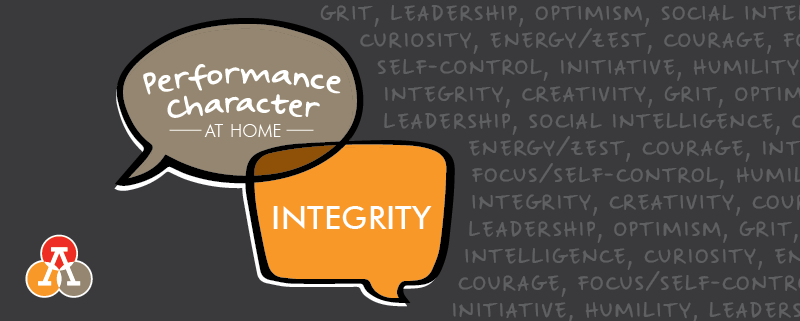“Integrity is doing the right thing, even when no one is watching.”
– C.S. Lewis
At Athlos schools, we focus on teaching children the importance of 12 traits that we call Performance Character traits. Our Performance Character pillar recognizes the deep connection between these traits and success. The development of Performance Character is integrated into every learning opportunity, allowing students to experience this connection first hand. Traits like humility, leadership, and integrity become a lens through which students view their learning as about more than grades, but as learning for life.
Like all important lessons, reinforcing learning at home is a key factor to success. One of the best ways for parents to do this is to positively model the traits at home and encourage trait development. In our 12-part ‘Performance Character at Home’ blog series, we offer simple, yet effective, ways to support children’s Performance Character development. In this blog, we look at integrity.
What is integrity?
Athlos defines integrity as striving to do the right thing all the time.
Why is integrity important?
Integrity is a trait that doesn’t always come naturally to children; it is learned through social interactions with peers and the examples set by educators, family members, and other adults in the community. Students who exhibit integrity are more empathetic, develop critical-thinking skills, and are more likely to refrain from academic misconduct such as cheating on exams. As Performance Character traits are integrated into student learning, the true test of integrity is exhibited when children exercise those traits outside of the classroom with others and on their own.
How can I help my child develop integrity?
Here are some ways you can help your family foster this trait at home:
- Foster empathy in your home by helping young children understand how their actions affect others. Provide them with opportunities to make choices that match their sense of ethics. This can be done by having the child interact with friends and family members close to their age or allowing the child to interact with, and aid in, taking care of a family pet or animal. These and similar opportunities allow feelings of integrity and responsibility to develop.
- Discuss scenarios with your child that involve the phrase “what would you do if.” Questions such as these can help children think about the decisions they will be faced with making in the future.
- Expect integrity by setting high standards for doing the right thing. This can be as simple as apologizing to someone, speaking kindly of others, returning lost or stolen valuables, and being a good neighbor.
- Be a model. Children watch and learn from adults’ actions. When your children see you wrestling with difficult decisions, managing conflicts, and acting with integrity, they’re more likely to do it themselves.



























